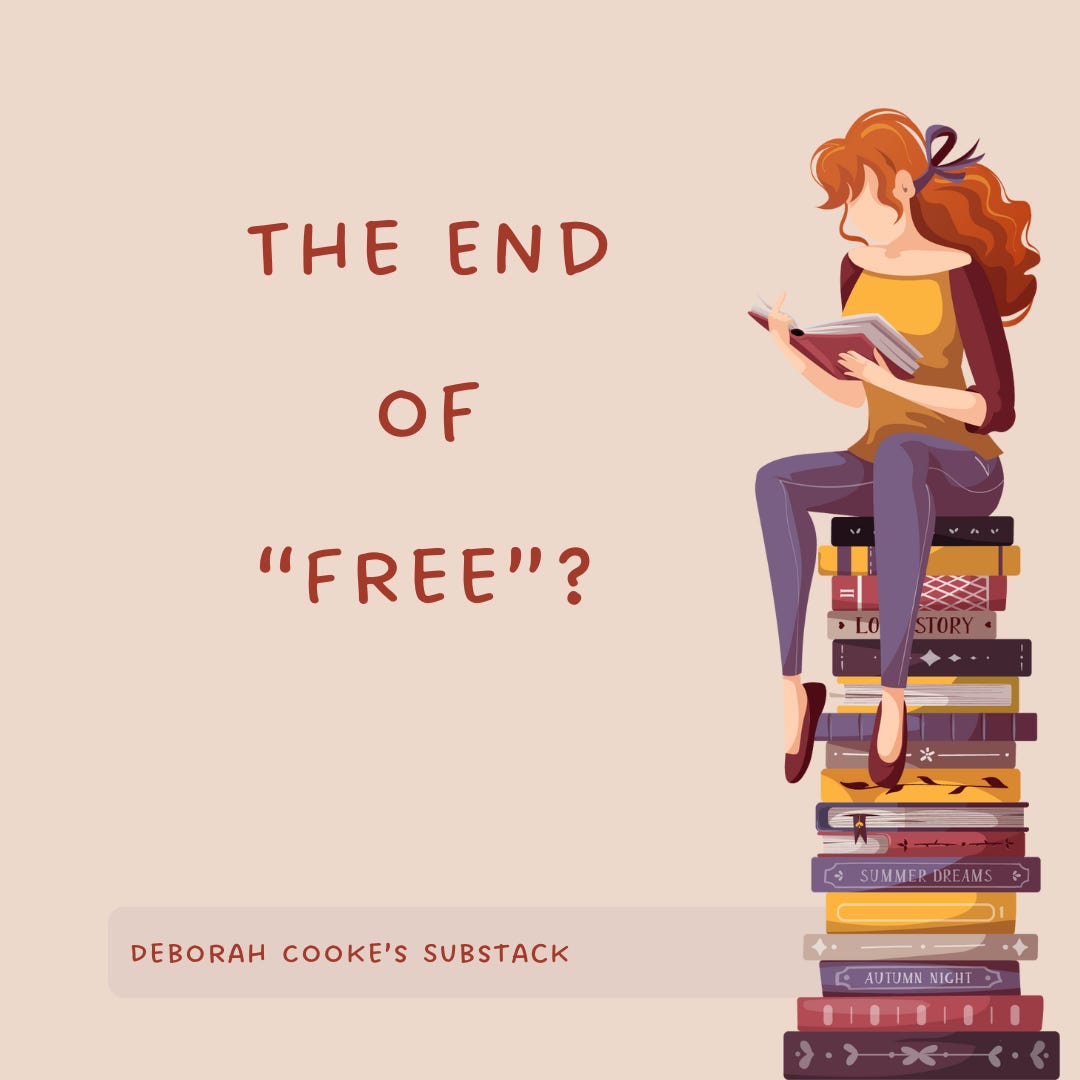The End of Free?
First in a series of posts about publishing and writing
Today, some thoughts about an established marketing strategy - offering a free read to build audience - and how its effectiveness may be changing. As usual, I’m sharing my own impressions and YMMV.
I’ve been thinking for a bit of how best to arrange my content. For years, I blogged about publishing and the writing life at intervals, but it messes up the SEO when mingled with my “Book X is a new release” or “Book Y is on sale” posts. I stopped making those posts on the blog, but I still ponder publishing and changes in publishing. Substack is going to be the place where I post all of that. Essentially this will be the place for all ponderings on the writing life, and striking that crucial balance between commerce and creativity. Along with this post, I’ve added a paywall - the publishing and writing posts will go behind it, and subscribers will be able to comment.
Making the first book in a series free is an established marketing tactic for authors, and one that has been very successful in the past. In recent years, though, the strategy has been losing its effectiveness, at least for me. Let’s take a look at possible reasons why that might be.
First-in-series-free was the brainchild of Julie Ortolon, an author and excellent marketer. In the early days of indie publishing, she negotiated with the portals to allow author-publishers to make a book free, with the idea of offering a free sample to potential readers. Amazon, in particular, never ceded this option for books outside of Kindle Unlimited. (She also lobbied for the original price to be displayed with a slash through it.) Her idea was that reading a book by an author was the best way to discover whether a reader liked that author’s books or not, and there’s less resistance to trying any product free. It was a tool for discovery.
The strategy worked brilliantly at the outset. Making a book free catapulted it up the rankings with no promotion at all in the early days. I remember making Double Trouble free when I was headed to a conference, maybe in 2012. I set the price to free at the other portals the day before I left, knowing that Amazon would match the free price at Apple at some point in time. By the time I arrived at the conference, Double Trouble was #1 in contemporary romance in the Amazon US store. It just happened on its own. *poof* Magic Visibility
Better yet, sales of the other three books in the series began immediately in those days. (Double Trouble is book two of a four-book series of contemporary romances and romantic comedies.) People really did read the free book, usually very quickly, then many would buy the linked books. In those days, you could run a BookBub featured deal for a free title and break even on the cost of the ad within an hour of the BB email going out by 9 AM eastern. You certainly would be making money by noon. Those ads were never cheap – although they’re much more expensive now – and the earnings came from the sales of the other books in the series. Many readers, obviously, took the free book and immediately bought the rest of the series, before they could even possibly have read the free book.
Why did that happen? Well, there weren’t a lot of free books in 2012, and BookBub was known to curate its list of advertised titles. Readers trusted that they would like the book and the series of whatever BB recommended.
Of course, that changed in time. Most of us are a little picky about our reads, and few of us have infinite resources for buying books. A book could be well-rated and reviewed, but not be one that inspired a specific reader to buy more of that series. So, the effectiveness of “free” inevitably began to diminish over the next few years. People would read the free book first before buying more of the series. That might happen in a day or two, but as free books became more widely available, unread free books piled up on e-readers and devices. I’m not the only person who saw a free book, thought “oh, that looks good!”, downloaded it and forgot about it. I have hundreds of unread free ebooks on my devices. There are people with thousands of them.
It’s not crazy then that earning out on an ad for a free book, whether through BookBub or another advertising vehicle, began to take longer. By 2015, it could take a day to earn out on a BookBub featured deal for a free book. Subsequently, some of my BB featured deals would fail to earn out at all.
The benefit of a crowded market is that patterns become more clear. Let’s take a look at some variables I see:



